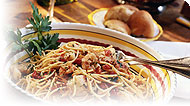Wheat-Free Diet

The Basics
The wheat-free diet is eaten by people who have an allergy to wheat, one of the most common food allergies in infants, young children, and adults. These people are required to eliminate all foods that contain wheat or wheat products, as well as some nonfood items, specifically cosmetics, that contain wheat, in order to avoid unpleasant reactions.
- Read labels carefully to determine if a wheat product is included and avoid any food you’re not sure about until you are able to verify that it is wheat-free.
- Learn the scientific and general terms for wheat, such as gluten, flour, and modified food starch.
- Ask manufacturers of medications, cosmetics, and other nonfood items if they use wheat in their products.
Best bets: Grains and starches such as buckwheat, millet, oats, potatoes, rice, and rye. A wheat-free diet is different from a gluten-free diet. Please see our section on gluten-free diet for more information.
Copyright © 2026 TraceGains, Inc. All rights reserved.
Learn more about TraceGains, the company.
The information presented by TraceGains is for informational purposes only. It is based on scientific studies (human, animal, or in vitro), clinical experience, or traditional usage as cited in each article. The results reported may not necessarily occur in all individuals. Self-treatment is not recommended for life-threatening conditions that require medical treatment under a doctor's care. For many of the conditions discussed, treatment with prescription or over the counter medication is also available. Consult your doctor, practitioner, and/or pharmacist for any health problem and before using any supplements or before making any changes in prescribed medications. Information expires December 2026.
